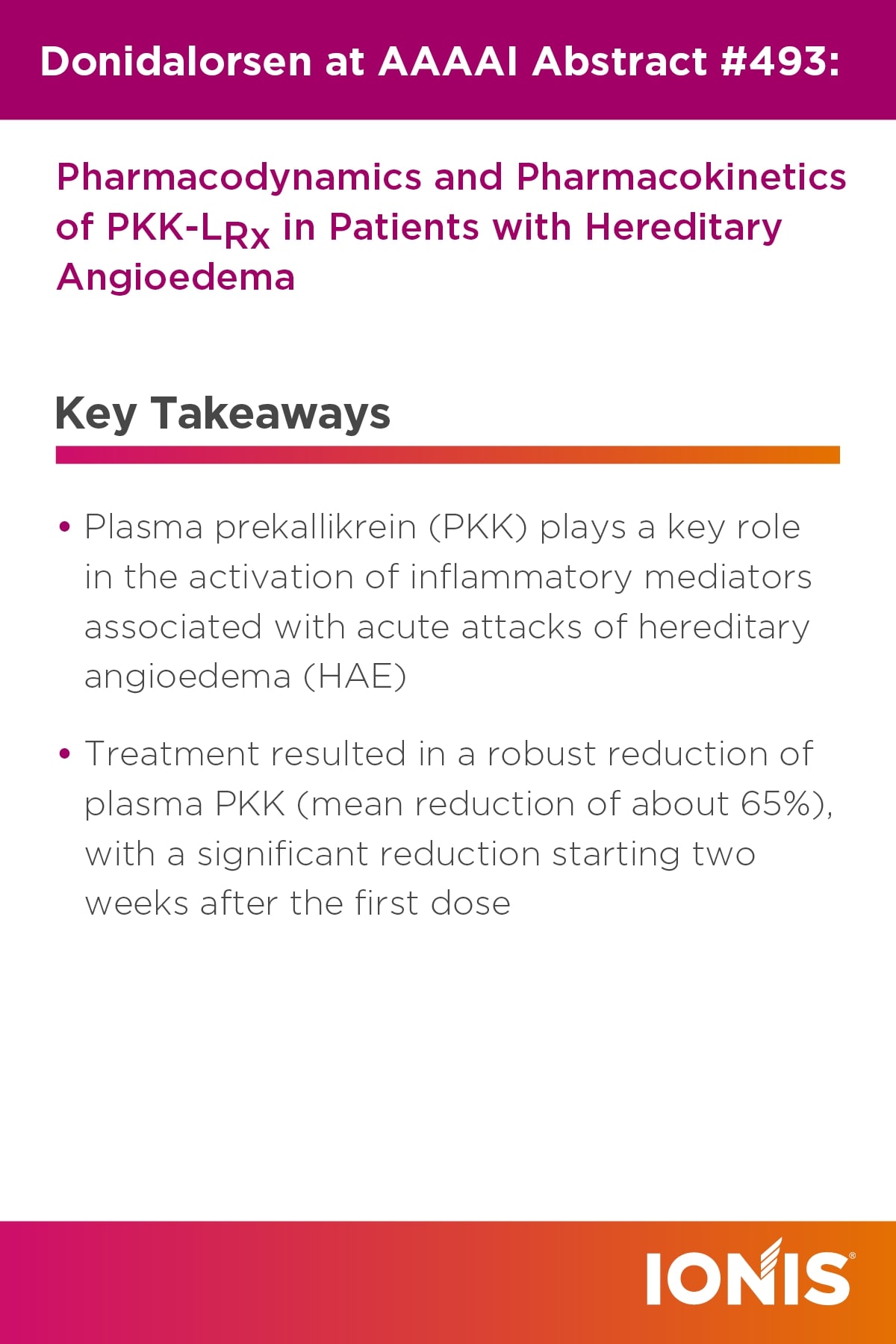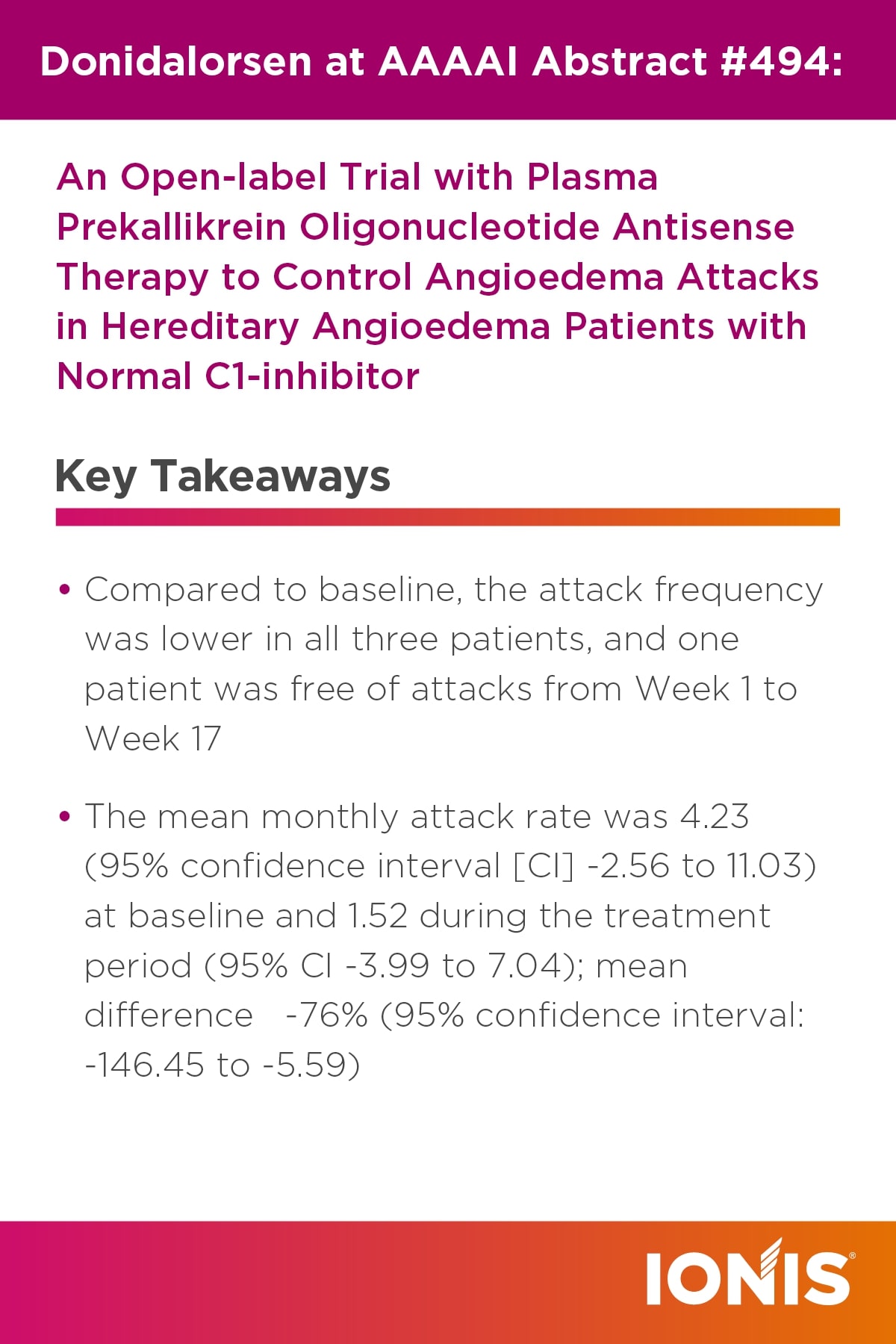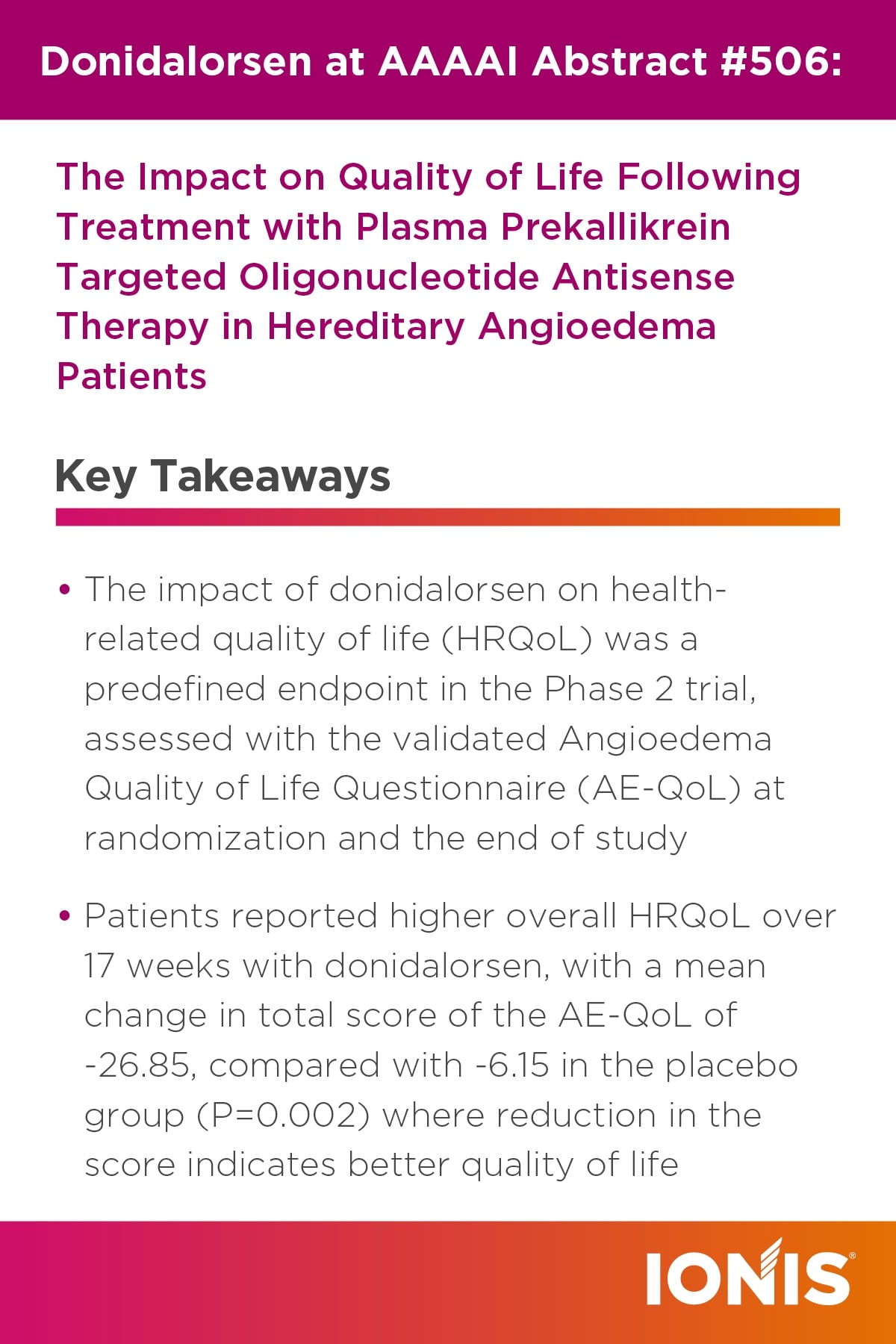Ionis announces publication of positive Phase 2 data for donidalorsen in New England Journal of Medicine
- Treatment with donidalorsen in Phase 2 study significantly reduced angioedema attacks by 90% and provided improvement in quality of life
- Published findings demonstrate favorable safety and tolerability profile of donidalorsen in Phase 2 study
- Donidalorsen is one of Ionis' wholly owned medicines the company plans to commercialize
CARLSBAD, Calif., March 16, 2022 /PRNewswire/ -- Ionis Pharmaceuticals, Inc. (Nasdaq: IONS), the leader in RNA-targeted therapies, today announced the publication of positive Phase 2 data for donidalorsen (formerly IONIS-PKK-LRx) in the New England Journal of Medicine (NEJM) available at NEJM.org. Donidalorsen is an investigational antisense medicine Ionis is evaluating for treating patients with hereditary angioedema (HAE). In the Phase 2 study, donidalorsen demonstrated a 90% reduction in angioedema attacks compared with placebo at the 80 mg monthly dose. There was significant improvement in quality of life as assessed by the Angioedema Quality of Life Questionnaire (AE-QoL) in the patients treated with donidalorsen.
Experience the interactive Multichannel News Release here: https://www.multivu.com/players/English/9020351-ionis-pharmaceuticals-announces-publication-of-positive-phase-2-data-for-donidalorsen-in-nejm/
Donidalorsen is designed to reduce the production of prekallikrein, which plays a key role in the activation of inflammatory mediators associated with acute attacks of HAE. Donidalorsen uses Ionis' advanced LIgand-Conjugated Antisense (LICA) technology platform.
"Positive Phase 2 data published in NEJM, along with data presented at the American Academy of Allergy, Asthma & Immunology (AAAAI) Annual Meeting, demonstrate that treatment with donidalorsen reduced attack frequency and disease burden of hereditary angioedema," said Kenneth Newman, M.D., M.B.A., Ionis' vice president of clinical development and leader of the immunology and pulmonology franchise. "The promising findings from this study are particularly encouraging as we continue to advance the Phase 3 clinical study for donidalorsen and underscore our commitment to deliver transformative treatments for patients with unmet therapeutic needs."
The Phase 2 study is double-blind and placebo-controlled in which patients with hereditary angioedema due to C1-inhibitor deficiency were randomized 2:1 to either 80 mg donidalorsen (n=14) or placebo (n=6) administered subcutaneously every 4 weeks for 16 weeks. The primary endpoint was the number of monthly angioedema attacks between weeks 1 and 17. Secondary endpoints included the time-normalized number of all, and only moderate or severe, angioedema attacks per month between weeks 5 and 17 and quality of life, measured with the AE-QoL. In this study, donidalorsen was safe and well tolerated.
The mean monthly rate of angioedema attacks was 0.23 (95% confidence interval (CI), 0.08 to 0.39) and 2.21 (95% CI, 0.58 to 3.85) in patients receiving donidalorsen and placebo, respectively (mean difference, -90%; 95% CI, -76 to -96%; P<0.001). The mean attack rate between Weeks 5 and 17 was 0.07 (95% confidence interval CI, -0.08 to 0.23) and 2.06 (95% CI, 0.41 to 3.72) in patients receiving donidalorsen and placebo, respectively (mean difference, -97%; 95% CI, -69 to –100%).
Patients reported higher overall health-related quality of life (HRQoL) over 17 weeks with donidalorsen, with a mean change in total score of the AE-QoL of -26.85, compared with -6.15 in the placebo group (P=0.002) where reduction in the score indicates better quality of life. There were improvements observed across all individual domains of the AE-QoL compared with placebo.
The majority of adverse events during the study were mild with a frequency that was similar between patients receiving donidalorsen and placebo groups. There were no deaths or serious adverse events. The most common treatment-emergent adverse events (TEAEs) reported in patients treated with donidalorsen were headache (14.3%) and nausea (7.1%), both of which occurred at a higher incidence in the placebo group. None of the patients discontinued treatment due to adverse events.
In addition to publication in NEJM, three abstracts analyzing data from the Phase 2 study were presented at the American Academy of Allergy, Asthma & Immunology Annual Meeting (#AAAAI22) in late February:
Abstract #493: Pharmacodynamics and Pharmacokinetics of PKK-LRx in Patients with Hereditary Angioedema
Plasma prekallikrein (PKK) plays a key role in the activation of inflammatory mediators associated with acute attacks of HAE. The pharmacodynamics and pharmacokinetics of donidalorsen were evaluated in the Phase 2 study.
Treatment resulted in a robust reduction of plasma PKK (mean reduction of about 65%), with a significant reduction starting two weeks after the first dose. The reduction in plasma PKK correlated with clinical improvement in HAE attacks.
Abstract #494: An Open-label Trial with Plasma Prekallikrein Oligonucleotide Antisense Therapy to Control Angioedema Attacks in Hereditary Angioedema Patients with Normal C1-inhibitor
Hereditary angioedema with nC1-INH-HAE (Type 3) is a very rare condition, characterized by recurrent and unpredictable swellings which are disabling and potentially fatal. There are currently no approved prophylactic treatments for this condition.
An additional group of three patients with nC1-INH-HAE were evaluated in a parallel-arm, open-label study of donidalorsen. Compared to baseline, the attack frequency was lower in all three patients, and one patient was free of attacks from Week 1 to Week 17.
The mean monthly attack rate was 4.23 (95% confidence interval [CI] -2.56 to 11.03) at baseline and 1.52 during the treatment period (95% CI -3.99 to 7.04); mean difference -76% (95% confidence interval: -146.45 to -5.59). Treatment with donidalorsen was well tolerated with no severe adverse events.
Abstract #506: The Impact on Quality of Life Following Treatment with Plasma Prekallikrein Targeted Oligonucleotide Antisense Therapy in Hereditary Angioedema Patients
The impact of donidalorsen on HRQoL was a predefined endpoint in the Phase 2 trial, assessed with the validated AE-QoL at randomization and the end of study.
Patients reported higher overall HRQoL over 17 weeks with donidalorsen, with a mean change in total score of the AE-QoL of -26.85, compared with -6.15 in the placebo group (P=0.002) where reduction in the score indicates better quality of life. There were improvements observed across all individual domains of the AE-QoL compared with placebo.
About Hereditary Angioedema
HAE is a rare and potentially fatal genetic disease that is characterized by rapid and painful attacks of inflammation in the hands, feet, limbs, face, abdomen, larynx, and trachea. HAE affects approximately 20,000 patients in the U.S. and Europe and can be fatal if swelling occurs in the larynx. In patients with frequent or severe attacks, doctors may use prophylactic treatment approaches to prevent and reduce the severity of HAE attacks.
About Ionis Pharmaceuticals, Inc.
For more than 30 years, Ionis has been the leader in RNA-targeted therapy, pioneering new markets and changing standards of care with its novel antisense technology. Ionis currently has three marketed medicines and a premier late-stage pipeline highlighted by industry-leading cardiovascular and neurological franchises. Our scientific innovation began and continues with the knowledge that sick people depend on us, which fuels our vision of becoming a leading, fully integrated biotechnology company.
To learn more about Ionis, visit www.ionispharma.com and follow us on Twitter @ionispharma.
Ionis Forward-looking Statement
This press release includes forward-looking statements regarding Ionis' business, and the therapeutic and commercial potential of Ionis' technologies, donidalorsen and other products in development. Any statement describing Ionis' goals, expectations, financial or other projections, intentions or beliefs is a forward-looking statement and should be considered an at-risk statement. Such statements are subject to certain risks and uncertainties, including those related to the impact COVID-19 could have on our business, and including but not limited to those related to our commercial products and the medicines in our pipeline, and particularly those inherent in the process of discovering, developing and commercializing medicines that are safe and effective for use as human therapeutics, and in the endeavor of building a business around such medicines. Ionis' forward-looking statements also involve assumptions that, if they never materialize or prove correct, could cause its results to differ materially from those expressed or implied by such forward-looking statements.
Although Ionis' forward-looking statements reflect the good faith judgment of its management, these statements are based only on facts and factors currently known by Ionis. As a result, you are cautioned not to rely on these forward-looking statements. These and other risks concerning Ionis' programs are described in additional detail in Ionis' annual report on Form 10-K for the year ended December 31, 2021, and the most recent Form 10-Q quarterly filing, which are on file with the SEC. Copies of these and other documents are available from the Company.




![]() View original content:https://www.prnewswire.com/news-releases/ionis-announces-publication-of-positive-phase-2-data-for-donidalorsen-in-new-england-journal-of-medicine-301504607.html
View original content:https://www.prnewswire.com/news-releases/ionis-announces-publication-of-positive-phase-2-data-for-donidalorsen-in-new-england-journal-of-medicine-301504607.html
SOURCE Ionis Pharmaceuticals, Inc.
Company Codes: NASDAQ-NMS:IONS
